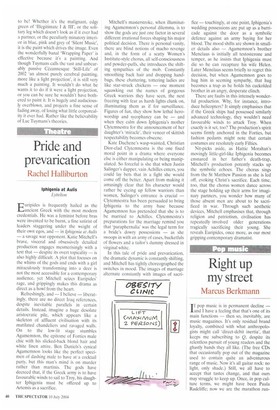Pride and prevarication
Rachel Halliburton
Iphigenia at Aulis Lyttelton
Euripides is frequently hailed as the ancient Greek with the most modern credentials. He was a feminist before bras were invented to be burnt, a fine satirist of leaders staggering under the weight of their own egos, and — in Iphigenia at Aulis — a savage war opponent. Katie Mitchell's brave, visceral and obsessively detailed production engages mesmerisingly with a text that — despite its overt topicality — is also highly difficult. A plot that focuses on the whims of the gods and ends with a girl miraculously transforming into a deer is not the most accessible for a contemporary audience, yet Mitchell seizes Euripides' rage, and grippingly makes this drama as direct as a howl from the heart.
Refreshingly, and — I believe — liberatingly, there are no direct Iraq references, despite inevitable parallels in certain details. Instead, imagine a huge desolate aristocratic pile, which appears like a skeleton of affluent civilisation with its mutilated chandeliers and ravaged walls. On to the low-lit stage stumbles Agamemnon, the epitome of Forties male chic with his slicked-back blond hair and white linen attire. Ben Daniels's cynical Agamemnon looks like the perfect specimen of dashing male to have at a cocktail party, but this man's mind is on murder rather than martinis. The gods have decreed that, if the Greek army is to have favourable winds to sail to Troy, his daughter Iphigenia must be offered up to Artemis as a sacrifice,
Mitchell's masterstroke, when illuminating Agamemnon's personal dilemma, is to show the gods are just one factor in several different irrational forces shaping his major political decision. There is personal vanity, there are blind notions of macho revenge and, in the form of a scatty Women's Institute-style chorus, all self-consciousness and powder-puffs, she introduces the shifting sympathies of the mob. Constantly smoothing back hair and dropping handbags, these chattering, tottering ladies are like star-struck chickens — one moment squawking out the names of gorgeous Greek warriors they have seen, the next freezing with fear as harsh lights clunk on, illuminating them as if for surveillance. Figures of fun, they show how lethal heroworship and sycophancy can be — and when they calm down Iphigenia's mother Clytemnestra for the announcement of her daughter's 'miracle', their veneer of skittish respectability becomes obscene.
Kate Duchene's wasp-waisted, Christian Dior-clad Clytemnestra is the one fixed moral point in a drama where everyone else is either manipulating or being manipulated. So forceful is she that when Justin Salinger's dapper. vain Achilles enters, you could lay bets that in a fight she would come off the better. Apart from making it amusingly clear that his character would rather be eyeing up fellow warriors than women, Salinger's entrance is crucial — Clytemnestra has been persuaded to bring Iphigenia to the army base because Agamemnon has pretended that she is to be married to Achilles. Clytemnestra's preparations for the marriage remind you that 'paraphernalia' was the legal term for a bride's dowry possessions — as she swoops in with an army of cases, bucketfuls of flowers and a tailor's dummy dressed in virginal white.
In this tale of pride and prevarication, the dramatic dynamic is constantly shifting, and Mitchell has tightly choreographed the switches in mood. The images of marriage alternate constantly with images of sacri
fice — touchingly, at one point, Iphigenia's wedding possessions are put up as a barricade against the door as a symbolic defence against an army baying for her blood. The mood shifts are shown in smaller details also — Agamemnon's brother Menelaus is initially all testosterone and temper, as he insists that Iphigenia must die so he can recapture his wife Helen. Later Menelaus seems briefly to regret this decision, but when Agamemnon goes to hug him in seeming sympathy, that hug becomes a trap as he holds his cuckolded brother in an angry, desperate clinch.
There are faults in this intensely wonderful production. Why, for instance, introduce helicopters? It simply emphasises that if the Greek ships had possessed similarly advanced technology, they wouldn't need favourable winds to attack Troy. When exactly is it set, too? The production's spirit seems firmly anchored in the Forties, but fashion pedants might note that certain costumes are resolutely early Fifties.
Nit-picks aside, as Hattie Morahan's movingly little-girl-like Iphigenia becomes ensnared in her father's death-trap, Mitchell's production potently stacks up the symbolic echoes. The chorus sings from the St Matthew Passion as she is led off, evoking Christ's sacrifice. Each time, too, that the chorus women dance across the stage holding up their arms for imaginary partners, you wonder how many of those absent men are about to be sacrificed in war. Through such aesthetic devices, Mitchell emphasises that, through religion and patriotism, civilisation has repeatedly involved older generations tragically sacrificing their young. She reveals Euripides, once more, as our most gripping contemporary dramatist.


























































 Previous page
Previous page